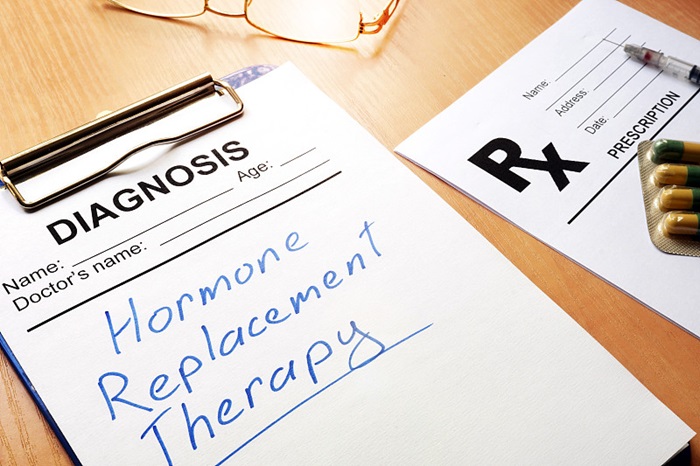Hysterectomy is a common surgical procedure in which the uterus is removed. Depending on the type of hysterectomy, the ovaries may also be removed. This can lead to a decrease in hormone levels, which can cause symptoms such as hot flashes, mood changes, and vaginal dryness. Hormone replacement therapy (HRT) is a treatment option that can help alleviate these symptoms.
Top 5 Hormone Replacement Therapies After Hysterectomy
Estrogen therapy
Estrogen therapy is the most common type of HRT for women who have had a hysterectomy. Estrogen can be taken in pill form, as a patch, or as a cream. Estrogen therapy can help alleviate symptoms such as hot flashes and vaginal dryness. However, it is important to note that long-term use of estrogen therapy may increase the risk of certain health issues, such as breast cancer.
Estrogen and progestin therapy
Estrogen and progestin therapy is another type of HRT that can be used after hysterectomy. Progestin is added to estrogen therapy to help protect against the risk of endometrial cancer. This type of HRT can help alleviate symptoms such as hot flashes and vaginal dryness. However, like estrogen therapy, long-term use may increase the risk of certain health issues.
Bioidentical hormone therapy
Bioidentical hormone therapy involves using hormones that are identical in molecular structure to the hormones produced by the body. This type of HRT can be customized to meet the individual needs of the patient. Bioidentical hormone therapy can help alleviate symptoms such as hot flashes and mood changes. However, it is important to note that the safety and effectiveness of bioidentical hormone therapy have not been fully established.
Testosterone therapy
Testosterone therapy may be used in women who have had a hysterectomy to help alleviate symptoms such as decreased libido and fatigue. Testosterone therapy can be given in the form of a patch, gel, or injection. However, it is important to note that the safety and effectiveness of testosterone therapy in women have not been fully established.
Complementary therapies
Complementary therapies, such as herbal supplements and acupuncture, may also be used to help alleviate symptoms of hormone imbalance after hysterectomy. However, it is important to note that the safety and effectiveness of these therapies have not been fully established.
The reasons to use hormone replacement therapy
Alleviate symptoms of menopause: After hysterectomy, women may experience symptoms of menopause due to a decrease in hormone levels. These symptoms can include hot flashes, night sweats, mood changes, and vaginal dryness. HRT can help alleviate these symptoms and improve quality of life for women.
Prevent osteoporosis: Decreased hormone levels after hysterectomy can also lead to a decrease in bone density, which can increase the risk of osteoporosis. HRT can help prevent bone loss and reduce the risk of osteoporosis.
Reduce the risk of heart disease: HRT may also help reduce the risk of heart disease in women who have had a hysterectomy. Estrogen therapy has been shown to improve cholesterol levels and reduce the risk of heart disease in some women.
Improve sexual health: Decreased hormone levels after hysterectomy can also lead to vaginal dryness and decreased libido. HRT can help improve sexual health and alleviate these symptoms.
Improve overall quality of life: HRT can help improve overall quality of life for women who have had a hysterectomy. By alleviating symptoms of menopause, preventing osteoporosis, reducing the risk of heart disease, and improving sexual health, HRT can help women feel better and enjoy a better quality of life.
Treatment after hysterectomy
Non-hormonal therapies:Non-hormonal therapies can be used to alleviate symptoms of menopause after hysterectomy. These therapies include:
Lifestyle changes: Women can make lifestyle changes such as exercising regularly, eating a healthy diet, and avoiding triggers that may worsen symptoms.
Alternative therapies: Alternative therapies such as acupuncture, herbal supplements, and relaxation techniques may also be helpful in alleviating symptoms.
Vaginal moisturizers and lubricants: Vaginal moisturizers and lubricants can be used to alleviate vaginal dryness.
Hormone replacement therapy (HRT):Hormone replacement therapy (HRT) is a treatment option that can help alleviate symptoms of menopause after hysterectomy. HRT includes:
Estrogen therapy: Estrogen therapy is the most common form of HRT and can be taken in the form of pills, patches, creams, or vaginal rings.
Estrogen and progestin therapy: Estrogen and progestin therapy is used for women who have not had a hysterectomy and includes both estrogen and progestin to protect the uterus.
Bioidentical hormone therapy: Bioidentical hormone therapy uses hormones that are identical in chemical structure to those produced by the body.
Testosterone therapy: Testosterone therapy may be used to alleviate symptoms such as decreased libido and energy levels.
Other medications:Other medications may be used to alleviate symptoms of menopause after hysterectomy. These medications include:
Antidepressants: Antidepressants such as selective serotonin reuptake inhibitors (SSRIs) and serotonin-norepinephrine reuptake inhibitors (SNRIs) may be used to alleviate symptoms such as hot flashes and mood changes.
Gabapentin: Gabapentin is a medication that may be used to alleviate hot flashes.
Clonidine: Clonidine is a medication that may be used to alleviate hot flashes.
Surgical options:Surgical options may be considered for women who have severe symptoms of menopause after hysterectomy. These options include:
Oophorectomy: Oophorectomy is the surgical removal of the ovaries and can be used to alleviate symptoms of menopause.
Vaginal rejuvenation: Vaginal rejuvenation is a surgical procedure that can be used to alleviate symptoms such as vaginal dryness and painful intercourse.
Conclusion
Hormone replacement therapy is a treatment option that can help alleviate symptoms of hormone imbalance after hysterectomy. Women should work with their healthcare provider to determine the best type of HRT for their individual needs. It is important to weigh the potential benefits and risks of HRT before starting treatment. By working with a healthcare provider and considering all treatment options, women can maintain optimal health and well-being after hysterectomy.
Related topics
-
Hormone Replacement Therapy: A Guide to Continuous Combined HRT
-
Does Hysterectomy Lead to Quicker Aging? Debunking Myths and Offering Support


